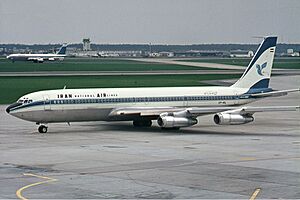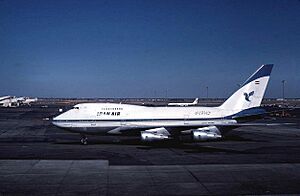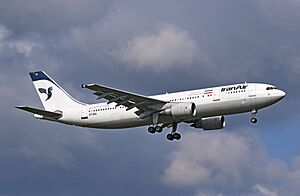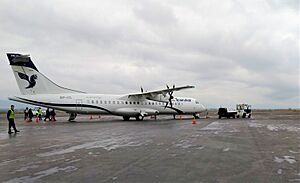Iran Air facts for kids
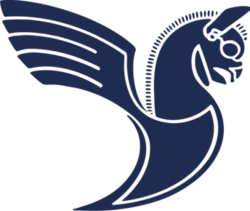
An Iran Air Airbus A330-200
|
|
| Founded | 1944 as Iranian Airways Company |
|---|---|
| Commenced operations | 1961 as Iran Air |
| AOC # | FS-100 |
| Hubs |
|
| Focus cities |
|
| Frequent-flyer program | SkyGift |
| Subsidiaries |
|
| Fleet size | 17 |
| Destinations | 75 |
| Parent company | Ministry of Roads and Urban Development (60%) |
| Headquarters | Mehrabad International Airport, Tehran, Iran |
| Key people | Hossein Khanlari, Chairman & CEO |
| Revenue | |
| Operating income | |
| Net income | |
| Total assets | |
| Total equity | |
| Employees | 10,696 (2013) |
Iran Air is the main airline of Iran. It is also known as The Airline of the Islamic Republic of Iran. Its main office is in Tehran at Mehrabad Airport.
As of 2024, Iran Air flies to 72 places in Asia and Europe. Its main airports are Imam Khomeini International Airport and Mehrabad International Airport in Tehran. In Iran, the airline is often called Homa. This name comes from a mythical Persian bird, like a phoenix or griffin. It is also short for Iran National Airlines in the Persian language.
Iran Air also has a cargo division called Iran Air Cargo. This part of the airline carries goods internationally using one cargo plane. In 2024, the airline faced sanctions from the United States and the European Union. This was because of its role in providing weapons to Russia during the Russia-Ukraine war.
Contents
History of Iran Air
How the Airline Started

Iranian Airways began in May 1944. After World War II, its first passenger flight went from Tehran to Mashhad. Soon after, it started flights to other cities in Iran. By 1947, it flew to places like Cairo, Baghdad, and Paris. Between 1945 and 1962, it became a big airline in Iran. It also had some international flights to Europe. The airline first used Douglas DC-3 planes. Later, it added Douglas DC-4 and Vickers Viscount aircraft.
In 1954, another private airline called Persian Air Services (PAS) started. PAS first carried only cargo. Then, it began flying passengers between Tehran and other big cities in Iran. In 1960, PAS started passenger flights to European cities like Geneva, Paris, and London. They used Boeing 707 and Douglas DC-7 planes rented from Sabena airline.
In 1961, Iranian Airways became a government-owned company. On February 24, 1961, Iranian Airways and PAS joined together. They formed the Iran National Airlines Corporation (HOMA), which is now known as Iran Air. They chose the Homa bird as their symbol. Iran Air became a full member of the International Air Transport Association (IATA) in 1964.
Growing Globally
In 1965, Iran Air received its first jet planes. These included the Boeing 707 and six Boeing 727-100s. Later, they added the Boeing 737-200 in 1971. By the mid-1970s, Iran Air was flying to many cities in Europe. They had over 30 flights a week to London alone.
On May 29, 1971, Iran Air started flights from Tehran to New York City. These flights stopped in London. Soon after, they used Boeing 747SPs for non-stop flights. This made Iran Air the second Middle Eastern airline to offer non-stop service to New York. With this flight, Iran Air set a new world record for a non-stop, scheduled long-haul flight. It lasted 12 hours and 15 minutes, covering 9,867 kilometers (6,131 miles). In 1978, the airline also bought six Airbus A300 planes. By the end of that year, Iran Air flew to 31 international places. These stretched from New York City to Peking and Tokyo.
Challenges and Changes
Due to economic sanctions against Iran, Iran Air found it hard to buy new planes or parts. The last time Iran Air received brand-new Western planes before 2016 was in 1994. They received two Airbus A300-B4s. These were given as compensation after Iran Air Flight 655 was shot down in 1988.
In 2001, Iran Air bought six used Airbus A300s from Turkey. However, after two years, these planes were grounded. This meant they could not fly. Officials said it was due to engine problems.
In March 2007, Iran Air started a flight from Tehran to Caracas, Venezuela. This flight stopped in Damascus. The airline shared this flight with Conviasa. However, the flight was very expensive to operate. Iran Air used a Boeing 747SP, which used a lot of fuel. Also, they had to limit passengers on the Damascus to Caracas part of the flight. This was because of the high altitude and heat, which made it hard for the plane to take off with a full load. Iran Air lost a lot of money on each flight. In October 2007, Conviasa took over the route.
Before 2011, Iran Air Tours, a part of Iran Air, mainly used Russian-made Tupolev Tu-154 planes. But after several accidents involving this plane, Iran banned its use by Iranian airlines in 2011. The Tu-154 planes were then replaced with MD-83s.
By 2014, over 100 planes in Iran, including some owned by Iran Air, were grounded. This was because of sanctions, which made it hard to get new parts and technical help. The long period of sanctions meant Iran Air's planes became very old. This also affected its safety record. As of March 2017, the average age of Iran Air's planes was 24.1 years.
Iran Air often had flights that were not on time. This made passengers upset. Officials usually blamed the delays on economic sanctions.
EU Ban and Refueling Issues
On July 5, 2010, an Iranian official said that the UK, Germany, and the United Arab Emirates refused to refuel Iranian passenger jets. This happened after the US put its own sanctions on Iran. Iran Air and Mahan Air both said they were denied fuel. However, a company in Abu Dhabi said it would continue to refuel Iranian flights. The UK Civil Aviation Authority said it was up to fuel suppliers to decide. Germany's Transport Ministry said EU or UN sanctions did not ban refueling Iranian aircraft. Later, Dubai Airport also said it continued to refuel Iranian flights.
On July 6, 2010, the European Commission announced a ban. It banned all of Iran Air's Airbus A320, Boeing 727, and Boeing 747 planes from flying into the EU. This was due to safety concerns. This greatly limited Iran Air's flights to Europe.
In 2012, the EU allowed Iran Air planes to refuel again at some European airports. This was to keep the refueling business within the EU.
New Planes and More Sanctions
| Manufacturer | Aircraft type | Orders | Deliveries |
|---|---|---|---|
| A320-200 | 6 | N/A | |
| A320neo | 32 | N/A | |
| A321-200 | 9 | 1 | |
| A330-200 | 9 | 2 | |
| A330-900 | 28 | N/A | |
| A350-1000 | 16 | N/A | |
| A380-800 | 12 | N/A | |
| Total | 100 | 3 | |
| 737 MAX 8 | 50 | N/A | |
| 777-300ER | 15 | N/A | |
| 777-9 | 15 | N/A | |
| Total | 80 | 0 | |
| ATR | 72-600 | 20 | 13 |
| Total | 200 | 16 | |
After some sanctions were lifted in January 2016, Iran Air was allowed to buy new planes. They planned to buy at least 100 large and small jets. All sanctions on Iran's civil aviation were lifted. This meant Iranian airlines could buy new planes and refuel at most European airports.
However, on May 8, 2018, the US withdrew from the Iran nuclear deal. The US then put sanctions back on Iran. This meant that Boeing and Airbus could no longer sell planes to Iran Air. Iran Air had to cancel its order for Boeing planes. It was unclear if Airbus planes would still be delivered.
In September 2024, Germany, France, and the United Kingdom announced new sanctions on Iran Air. These sanctions limited the airline's ability to fly into European airspace. In the same month, the United States Department of the Treasury sanctioned Iran Air. This was because of its role in transferring weapons to Russia during the Russia-Ukraine war. In October 2024, the European Union also sanctioned Iran Air for transferring ballistic missiles to Russia.
Onboard Rules
Iran Air is one of the few airlines that does not serve alcoholic beverages on its flights. This is because of Islamic dietary laws. Also, the food menu does not include non-Halal options, such as pork. Many airlines in Muslim countries have similar rules.
Where Iran Air Flies
As of September 2023, Iran Air flew to many places in Iran and other countries in Asia and Europe. In late 2024, the European Union put sanctions on Iran Air. This led to all flights to the European Union being canceled.
Main Airports
Iran Air has always been based in Tehran, the capital of Iran. It flew all its flights from Mehrabad Airport. In 2005, it started using Imam Khomeini Airport for international flights. By 2007, all international flights moved to Imam Khomeini Airport.
Iran Air also has other important cities it flies to often. These include Isfahan, Mashhad, Shiraz, and Tabriz.
Pilgrim Flights
Until 2016, flying pilgrims for Hajj was a big part of Iran Air's yearly work. Every year, many thousands of pilgrims flew from Iranian cities to Jeddah, Saudi Arabia. Jeddah is the airport gateway to Mecca, where pilgrims perform religious ceremonies. In 2016, due to problems between Iran and Saudi Arabia, all Hajj flights from Iran were stopped. These flights started again in 2017.
Iran Air used to have agreements to share flights with these airlines:
Iran Air's Planes
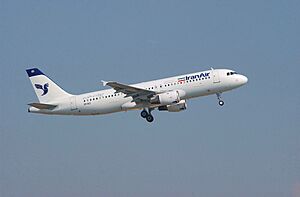

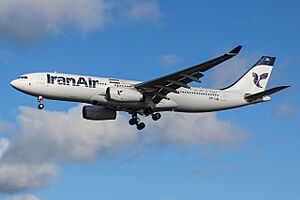
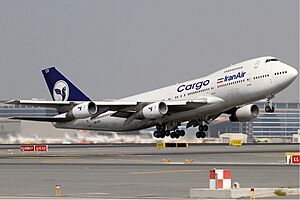
Current Planes
As of April 2025, Iran Air uses the following planes:
| Aircraft | In service | Passengers | ||
|---|---|---|---|---|
| H | E | Total | ||
| Airbus A300B4-200 | 1 | 18 | 236 | 254 |
| Airbus A300-600R | 3 | 22 | 239 | 261 |
| Airbus A310-300 | 1 | 14 | 198 | 212 |
| Airbus A319-100 | 2 | 12 | 108 | 120 |
| Airbus A320-200 | 3 | 12 | 144 | 156 |
| Airbus A321-200 | 1 | 12 | 182 | 194 |
| Airbus A330-200 | 2 | 32 | 206 | 238 |
| 2 | 18 | 246 | 264 | |
| ATR 72-600 | 5 | — | 68 | 68 |
| Fokker 100 | 3 | — | 104 | 104 |
| Iran Air Cargo Fleet | ||||
| Boeing 747-200C/SF | 1 |
|
||
| Total | 24 | |||
Past Planes
Iran Air has used many different types of planes in the past:
| Aircraft | Introduced | Retired | Notes |
|---|---|---|---|
| Airbus A300B2-200 | 1980 | 2019 | One was shot down as flight IR655 in 1988. |
| Airbus A300B4-200F | 2008 | Unknown | Some are currently stored. |
| Airbus A310-200 | 2001 | 2009 | Some were from Turkish Airlines. |
| Avro York | Unknown | Unknown | Used by Persian Air Services before the 1962 merger. |
| Boeing 707-300 | 1965 | 2000 | |
| Boeing 727-100 | 1965 | 2006 | One crashed as flight IR291. |
| Boeing 727-200/Adv | 1974 | 2014 | One crashed as flight IR277. |
| Boeing 737-200 | 1971 | 2004 | |
| Boeing 747-100B | 1974 | 2014 | Iran Air was the first and last airline to use this model. |
| Boeing 747-200M | 1976 | 2016 | |
| Boeing 747SP | 1976 | 2018 | All are stored. |
| Douglas DC-3 | Unknown | 1972 | Used by Iranian Airways before the 1962 merger. |
| Douglas DC-4 | Unknown | 1960 | Used by both airlines before the merger. |
| Douglas DC-6B | Unknown | 1972 | |
| Douglas DC-7C | Unknown | Unknown | Used by Persian Air Services before the 1962 merger. |
| Vickers Viscount | Unknown | 1960 |
Concorde Order
On October 8, 1972, Iran Air ordered two Aérospatiale-BAC Concorde supersonic jets. They also had an option for one more. This made them the last airline to order Concorde planes for regular flights. However, Iran Air later canceled these orders in April 1980.
Past Companies of Iran Air
Iran Air Tours
Iran Air Tours started in 1973. It was a company fully owned by Iran Air. It focused on charter flights and tourism. In 2011, another company bought it. But the new owner could not pay its bills. So, the airline went back to being private in 2016.
Homa Hotel Group
Homa Hotel Group was founded in 1979 by the Government of Iran. This happened after the government took over the hotel industry. As of 2016, it was owned by Iran's Social Security Organization.
Safety Events
Overview of Incidents
Before Iran Air was formed in 1962, the two airlines that merged had several plane losses. Iranian Airways lost six Douglas DC-3s in crashes and a fire. One of its Douglas DC-4s was shot down in 1961. Persian Air Services lost three Avro Yorks in crashes and a maintenance accident. Since 1962, Iran Air has had more than a dozen plane losses in crashes. This includes the shooting down of Iran Air Flight 655. The airline has also had twenty hijacking events on its planes.
Notable Incidents
- On January 21, 1980, Iran Air Flight 291, a Boeing 727-100, crashed. It hit high ground north of Tehran during a snowstorm. This happened while it was trying to land at Mehrabad Airport. All 128 people on board died.
- On July 3, 1988, Iran Air Flight 655 was flying over the Persian Gulf. A United States Navy ship, the USS Vincennes, shot down the plane with a missile. The US said its crew thought the airliner was a fighter jet. All 16 crew and 274 passengers were killed.
- On January 9, 2011, Iran Air Flight 277, a Boeing 727-200, crashed. It was near Orumiyeh, northwest of Tehran. This happened during an attempted landing in bad weather. It was carrying 105 people, and at least 78 died.
- On October 18, 2011, Iran Air Flight 742, a Boeing 727-200, landed with its nose landing gear stuck. This happened at Mehrabad International Airport. All 113 people on board survived without injury.
Images for kids
-
An Iranian Airways Douglas DC-3 freighter in 1954
-
An Iran Air Boeing 707-320 at Frankfurt Airport in 1970
-
An Iran Air Boeing 747SP at John F. Kennedy International Airport in 1976
-
An Iran Air Airbus A300B4-600R lands at London's Heathrow Airport in 2014.
-
Iran Air Airbus A320-200
-
Iran Air Airbus A321-200
-
Iran Air Airbus A330-200
-
Iran Air Cargo Boeing 747-200C
See also
 In Spanish: Iran Air para niños
In Spanish: Iran Air para niños
- Airlines of Iran
- Airports of Iran
- Iran Civil Aviation Organization
- Tourism in Iran
- Transport in Iran


